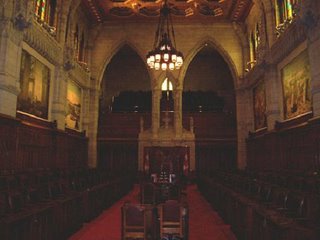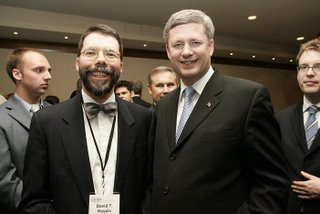
Two months ago I received an unexpected invitation from Lorne Gunter, a columnist for the National Post and the Edmonton Journal, to speak at the 10th annual conference of the Civitas Society, which styles itself "A society where ideas meet." This was based on his reading of an article I wrote for Comment last year, titled, The city and its renewal, which recently came out in the periodical's print edition. I hadn't known much about Civitas other than in the pages of Lloyd Mackey's The Pilgrimage of Stephen Harper, which I had read not too long before. From this I knew that Civitas was a small-c conservative think tank bringing together a number of prominent politicians, political staffers, academics and journalists of a generally "right-wing" persuasion. The invitation came as something of a surprise, because my cities article did not seem obviously to fit into a right-wing mould, as that is usually understood nowadays. Yet I was pleased to accept.

I arrived in Ottawa thursday afternoon after a 6-hour drive from Hamilton. I had a wonderful dinner with my friends Eric and Bertina Hogeterp and their two boys. We were joined by another Redeemer political science graduate, Derek Miedema, who works for the EFC. The following morning Eric and I attended Question Period in the House of Commons, which occurs at 11.15 on fridays. Afterwards I was honoured to have David Sweet, the new Member of Parliament for Ancaster-Dundas-Flamborough-Westdale, come down to greet me in the hallway near the Peace Tower. I myself do not live in his riding, but Redeemer is located there. During Members' Statements at 11, Sweet mentioned Hamilton's "two universities, McMaster and Redeemer." Of course, cameras and other electronic devices are not allowed in the Commons chamber, but because the Senate was not in session, I was able to photograph the impressive interior of the Red Chamber (above left), as well as the gallery of portraits of Canada's monarchs just outside.
After this I made the 20-minute drive to the Brookstreet Hotel in Kanata, where the Civitas conference was taking place. During the reception that evening, Prime Minister Stephen Harper made an unscheduled appearance. I cannot recall how long he stayed, but it took some time for everyone who wished to meet him to do so. I myself was privileged to talk with him briefly and shake his hand. (If Harper had been aware of my track record, he might have declined the honour. After all, like his ill-fated predecessor, he is a Conservative with a precarious minority government!) After Harper and his entourage left, John Baird, the President of the Treasury Board, made an exceedingly partisan speech, filled with barbed humour at the expense of the various Liberal leadership hopefuls.
Saturday morning saw the first of the sessions, devoted to "Property Rights: the most fundamental freedom," followed by a session on a topic that at first blush might not seem to be related to the previous one: "Euthanasia: the next battle in the culture wars." In fact, however, both sessions brought out the barely latent tensions between two principal factions in the conservative coalition, the libertarians and what might be called the social or traditional conservatives. The former are individualists to the core, preferring to minimize government control to the greatest extent possible. As such, they enthusiastically champion the free market and are usually willing to tolerate abortion, euthanasia and other activities on which the social conservatives deem it necessary to legislate. After all, if we have property rights over our own bodies, then why not allow euthanasia? As one participant put it, if our bodies are not ours to do with as we see fit, then they belong to the state. Yet I heard no one make a case for allowing individuals to sell themselves into slavery, which indicates that even libertarians are not willing to follow all of their own ideas to their logical conclusion.

The luncheon remarks by Frank Luntz, a Republican Party strategist from south of the border, were certainly the most controversial. This was the part of the weekend picked up by the domestic media, and Harper's meeting with Luntz a day earlier was the subject of opposition criticism during monday's Question Period. The title of Luntz' talk, "Massaging the Conservative Message for Voters," carried all the flavour of a proposal for an ad campaign. Subtleties and nuances may be the mark of academic discourse, but they can only cloud an election campaign. Luntz' basic message? Keep it simple, hammer the opposition, and hire me next time. Incidentally, Luntz' appearance was arranged by the Manning Centre for Building Democracy, a partisan think tank associated with the Conservative Party of Canada.
The other four sessions dealt with the role of the courts in democracies, foreign and defence policies, electoral reform, and the future of Canadian cities. The schedule was tightly packed, leaving little time to catch one's breath. I missed George Jonas' speech saturday evening, due to fatigue. I would also like to have heard more on electoral reform the following morning, since I myself have written popular pieces on the subject. But I thought it best to cut out a little early to prepare for the final session on cities, in which I myself was participating. In fact, I was the very last speaker at the conference. Knowing this in advance, I feared I would be addressing a vastly reduced assembly, as some were present only for saturday. Yet this was not the case: even the final session drew a fairly large turnout.
I shall resist the temptation to engage in name-dropping, though it would be easy to do for such an event. Suffice it to say that there were a large number of well-known people — scarcely less well known than the Prime Minister himself. Representatives of a number of vaguely kindred organizations were also present, including one from the Association of Women Shooters of Canada! I myself spent much of the time with WRF people. Perhaps not surprisingly, I felt most comfortable with the traditional conservatives, even if I myself am loath to wear that label. I found myself least in agreement with the positions of the libertarians, though I found a number of these to be quite likable as persons.
At the end of the day, I found myself wondering whether everyone present really had all that much in common. Thomists, neocalvinists and traditionalists who speak the language of natural law, creation order and moral order respectively would not seem immediately to share much with those who view the state as little more than a constant threat to their own individual autonomy. In fact, there are professed socialists with whom at least this neocalvinst would have more in common. In my Political Visions and Illusions I point out the protean character of conservatism, especially the desire of different professed adherents to conserve a variety of perceived goods. This is particularly notable with respect to a view of the state. Unlike liberalism with its contractarian notion of the state, there is no single, philosophically coherent account of political order that can obviously claim the conservative label. If there was a common definition of conservatism at Civitas, it seemed to revolve around, not so much the respect for tradition and the accumulated wisdom of the ages, as smaller government and lower taxes — a somewhat deracinated agenda that would be largely incomprehensible to European conservatives of, say, the 19th and early 20th centuries, and even to Canadian conservatives of an earlier generation. In short, Civitas illustrates both the virtues and defects of the conservative movement(s) in this country. In this it is no different from the partisans of the rival political perspectives.
I was told that this particular Civitas conference was more evidently partisan than its predecessors. For the first time since Civitas was founded there is a large-C Conservative government in office. Even the taste of power can be a heady experience. How long will it all last? Luntz held out the possibility of keeping power for 20 years. My admittedly unprofessional advice? Don't put away your coat and hat too soon. After all, this is only a minority government.

No comments:
Post a Comment